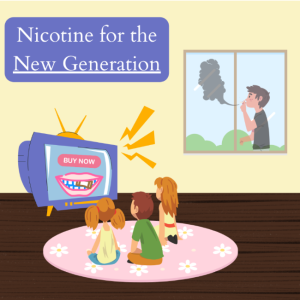ZYNs: How Nicotine is Infiltrating the New Generation
By Danielle Rodriguez, C2ST Intern, Waubonsee Community College
A few months back, I was in class when a nearby friend offered me a ZYN. They pulled out a small circular tin, opened it, and revealed 10-20 pillow-looking pouches. I politely declined, as I had no idea what these things were. After class, I did a little research. When I mention the topic of ZYNs to anyone above a college-age group, they often have not heard of this product. The recent increase in ZYN usage amongst my peers has inspired me to write this article and inform more people about what ZYNs are and the risks they pose.

So, what are ZYNs? ZYNs are nicotine products that resemble tiny tea bags, or as stated above, pillows. Though nicotine is the main ingredient in ZYNs, these pouches also contain plant-based fibers and sweeteners such as citrus and cinnamon. Users place these pouches between their upper lip and gums, allowing the nicotine to be absorbed through saliva. The dose of nicotine varies between 3 mg and 12 mg per pouch. For reference, one cigarette contains 10-14 mg of nicotine. While ZYNs may appear to be a much safer, cleaner way to get a nicotine kick, there are still many precautions to be taken when using and marketing this substance.
The short-term effect of nicotine is a rush of dopamine, often creating feelings of focus and relaxation. However, these effects are short-lived and once they wear off, users are left feeling more anxious, irritable, and even depressed. Nicotine also increases heart rate and blood pressure. Those who use this substance chronically are at much greater risk of cardiovascular disease and heart attack. Because ZYNs and other nicotine pouches are still new to the market, researchers do not yet know what the long-term effects may be. Some experts believe these pouches can cause gum deterioration and lead to periodontal disease. Other experts think the pouches may contain unknown carcinogens that put users at risk of developing cancer.
Previous research has shown that nicotine is extremely addictive, especially for children and teenagers whose brains have not fully developed. During a press conference toward the end of January, Senator Chuck Schumer warned of children becoming addicted to nicotine products and called on the FDA and FTC to investigate the product’s health and marketing tactics. He is not the first to argue that these nicotine pouches are being purposely marketed to children. Dr. Nidhi Kumar told CBS, “The packaging looks like candy…who are these products appealing to? Young people.”
The sales of ZYNs alone rose in the United States by 58.8% in 2019 and 2022, then a further 66% in the last four months of 2023. Some doctors consider ZYNs a safer nicotine option for those who smoke cigarettes as they have fewer cancer-causing chemicals in them but more research still needs to be done to determine the full health effects of this product.
References:
- What is Zyn? Doctors share health concerns of the popular and controversial nicotine pouch – CBS News
- Are Zyn Nicotine Pouches Harmful to Your Health? What to Know. – The New York Times (nytimes.com)
- What are nicotine pouches, and are they actually better for you than cigarettes? | Well actually | The Guardian
- https://www.hsph.harvard.edu/news/hsph-in-the-news/zyn-pouches-safer-than-smoking-but-still-pose-risks/#:~:text=%E2%80%9CZyn%20presents%20significantly%20lower%20health,cigarette%20smoke%2C%E2%80%9D%20Rees%20said.